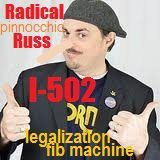
How can NORML bad-mouth and soft-sell a legalization in Ohio that’s better for marijuana consumers than the no-home-grow and per-se-DUID they eagerly promoted in Washington State?
Last night I received some email from colleagues in marijuana law reform who are upset by my last column that called out the big four marijuana law reform groups (NORML, DPA, MPP, & ASA) for ignoring, soft-selling, or criticizing Ohio’s chance to legalize marijuana just nineteen days from now.
I hope everybody reading this understands I have the utmost of love and respect for the major drug reform orgs. I started my activism with Oregon NORML from 2005-2008, worked for National NORML from 2009-2012, and this year, I co-formed Portland NORML. It’s because of that love and respect that I am so disappointed that the reform orgs aren’t pushing harder to help free our people and help our patients in Ohio.
 It was in that capacity as NORML’s Outreach Coordinator in 2011 and 2012 that I was the only national representative living in the Pacific Northwest. When Initiative 502 was circulating in Washington to legalize marijuana, many of my regional activist friends were dead set against it. My strong and, at times, vicious support of I-502 earned me nasty internet picture memes, threats of physical harm, and blacklisting by some that still exists to this day.
It was in that capacity as NORML’s Outreach Coordinator in 2011 and 2012 that I was the only national representative living in the Pacific Northwest. When Initiative 502 was circulating in Washington to legalize marijuana, many of my regional activist friends were dead set against it. My strong and, at times, vicious support of I-502 earned me nasty internet picture memes, threats of physical harm, and blacklisting by some that still exists to this day.
Some were vehement that I-502’s passage would destroy the lax, unregulated medical marijuana system, but that system was bound to be cracked down on whether legalization passed or not. The legitimate complaints they raised were that I-502 would still allow for the arrest of home cultivators, thus forcing consumers to purchase from the retail stores, and that I-502 instituted an unscientific per se DUID that would criminalize any regular consumer caught driving.
It was a very difficult moral decision for me to support I-502. My support for marijuana law reform has always been a three-part test:
- Does it improve the plight of cannabis consumers?
- Does it improve the plight of cannabis growers?
- Does it equalize our status with alcohol consumers?
For I-502, it was a mixed bag. It certainly improved point 1 by making it legal to possess and buy marijuana. It maintained the status quo for point 2 by keeping home growing illegal. But it worsened the status quo for point 3 by making us easier to convict of DUID than a drunk driver. In the end, I decided the chance of me getting caught in Washington with a bag of weed were greater than the chances I’d be caught in a car accident or pulled over for poor driving and subject to a blood test that would prove me guilty of a DUID I didn’t commit.
In the year 2012 to this date (Oct 15), there were eleven results (see below) from the NORML website regarding Washington’s I-502, not counting the numerous blog posts I had written on the now-defunct NORML Daily Audio Stash blog. The first was a spirited defense of I-502 against the two legitimate complaints being raised by consumers, entitled NORML’s Official Reply To ‘Patients Against I-502’, where executive director Allen St. Pierre wrote:
We fully recognize the per se DUI marijuana provisions in I-502 are arbitrary, unnecessary, and unscientific… We believe the overall impact of this proposal, if approved by voters this fall and enacted, will be overwhelmingly helpful to the vast majority of cannabis consumers in the state… Thus, NORML’s Board of Directors voted unanimously (including the two members from WA) to endorse the initiative, while maintaining our opposition to per se DUID provisions in principal.
Additionally, at NORML we also support the right of consumers to grow their own marijuana… the sponsors found through their polling that the inclusion of the right to cultivate marijuana for personal adult use would reduce their level of public support below that needed for approval. Again, while we continue to support personal cultivation, we believe the initiative still deserves our support, despite this calculated omission by I-502’s sponsors.
In the year 2015 to date, there are seven results from the NORML website regarding Ohio’s Issue 3. The first of those was Sorting Through the Marijuana Mess in Ohio. NORML Founder Keith Stroup wrote:
As might be expected, this proposal, which would enshrine this special privilege for these investors in the state constitution, has met with some cries of outrage from some in the Buckeye state, both legalization activists and the state legislature.
Some activists have raised objections to the proposal because it would not permit average Ohioans to compete for the commercial cultivation licenses…
…[W]e should not act shocked to learn that someone is going to get rich off marijuana legalization in Ohio, should it occur.
Nor should opponents act so offended by the fact that average citizens in Ohio do not have the resources to be part of those investors who would control the commercial cultivation licenses.
It’s a decent defense of Issue 3, but hardly a ringing “[this] will be overwhelmingly helpful to the vast majority of cannabis consumers” endorsement that I-502 got. And nobody from NORML ever called I-502 a “marijuana mess”.
Other posts by NORML this year about Ohio Issue 3 also focus on the negatives of Issue 3. In No More “Joe Camel,” Please!, Keith Stroup chastised the Issue 3 campaign for their use of a cartoon mascot, Buddie, as a get-out-the-vote effort on college campuses. It’s hard to fault NORML for criticizing that irresponsible act by Issue 3’s campaign, but Stroup takes it further by impugning the entire Issue 3 campaign:
The fact that such a silly, and potentially politically harmful public educational initiative would have been launched raises serious questions about how professional this sponsoring group of investors really are.
Those of us who support the legalization of marijuana in Ohio will be watching closely in the coming weeks to see if this debacle was just an isolated stumble, reflecting a lack of sensitivity to the special concerns that apply to drug use and drug policy; or if it is a symptom of a group with more money than common sense.
Buddie was certainly a mistake, but how can one question the professionalism of a group that was able to gather the signatures, make the ballot, produce quality television ads, and generate the same polling numbers as Washington’s I-502, without I-502’s Drug Policy Alliance billionaire backer?
Speaking of television ads, in 2012, New Approach Washington produced numerous professional ads. NORML embedded three of them on their website in Marijuana Legalization Proponents in Washington Unveil First TV Ad and NEW I-502 TV Ads: Former Federal Law Enforcement Officials Support Marijuana Legalization.
But in 2015, ResponsibleOhio has produced and aired as many TV ads as New Approach Washington did, and NORML has yet to feature any of those ads on its website.
As for the rest of NORML’s mentions of Issue 3, we have ResponsibleOhio Initiative Qualifies For The 2015 November Ballot and Ohio: Measure To Regulate Retail Cannabis Sales Qualifies For November Ballot to announce in August when the initiative officially became Issue 3. These were just neutrally-toned news blurbs that announced the basic facts of the measure. Two more posts, 2016 Will Be a Watershed Year for Marijuana Legalization and Swing States: Super-Majorities Endorse Medical Cannabis Access, Men Support Broader Legalization just make passing mention of Ohio’s Issue 3.
The last of seven relevant results for Ohio’s Issue 3 on NORML’s website is Investor-Driven Legalization: A Bitter Pill to Swallow. There, Keith Stroup informs us that for Ohio Issue 3, unlike the National Board’s unanimous support for Washington’s I-502, “the endorsement was less than unanimous; a couple of board members abstained, and one flatly opposed the endorsement, to register their displeasure with the self-enrichment aspects of the Ohio proposal.” Stroup went on to point out all that was wrong with Issue 3:
Using the cover of badly needed criminal justice reform, the investors, operating under the name of Responsible Ohio, are seeking what is clearly an unfair advantage in the “green rush” that is certain to follow marijuana legalization when it is adopted in Ohio.
So the NORML board felt obliged to hold our noses and endorse Issue 3 in Ohio. It was, as the saying goes, “a bitter pill to swallow,”… I believe it was the right decision.
But it surely does feel like the loss of innocence.
Now to be fair, Washington’s I-502 qualified in February, while Ohio Issue 3 qualified in August. NORML usually doesn’t comment on or endorse legalization initiatives until they have qualified. And there were more polls on I-502 to report on than on Issue 3.
However, NORML also had its celebrity advisory board member, travel host Rick Steves, co-sponsoring I-502, pumping hundreds of thousands of dollars into the campaign, and engaging in a statewide barnstorming tour to promote Washington legalization without home grow, with a per se DUID, and a limit of 1 pot shop per over 20,000 residents. In Ohio, nobody from NORML is touring to promote legalization with home grow, without a per se DUID, and a limit of 1 pot shop per 10,000 residents. Worse, their state affiliate, Ohio NORML, and most of its local chapters are openly campaigning against the measure.
How could Ohio cannabis consumers be blamed for perceiving that NORML considers the wrong people getting rich on growing marijuana as something we have to “hold our noses” over, but consumers risking unimpaired DUIDs and continuing home grow felonies was something to enthusiastically promote?
I get emails and comments regularly from Ohio tokers who are thanking me for eagerly promoting Ohio’s legalization and providing them the statistical and rhetorical tools necessary to fight back against all the opponents of legalization, including NORML’s own local Ohio chapters. They are the same kind of thanks I got when I worked for NORML and used the (now-disappeared) NORML Daily Audio Stash blog to beat back the No on I-502 campaign. I’m truly saddened that cannabis consumers aren’t getting those resources from NORML.
Google Search: site:norml.org Washington = 11 relevant results in 2012
- 2012-02-02 = Washington: Marijuana Regulation Measure Certified For 2012 Ballot
- 2012-02-24 = NORML’s Official Reply To ‘Patients Against I-502’
- 2012-02-25 = WA: New Poll Shows 47% of Likely Voters Support I-502, 15% Undecided
- 2012-06-19 = NEW POLL: Majority of Washington State Voters Support Marijuana Legalization Initiative I-502
- 2012-07-23 = Poll: Support for Marijuana Legalization Initiative Growing in Washington
- 2012-08-06 = Marijuana Legalization Proponents in Washington Unveil First TV Ad
- 2012-08-16 = This Weekend In Seattle: Earth’s Largest Pro-Marijuana Law Reform Rally
- 2012-09-12 = NEW POLL: Washington’s Marijuana Legalization Initiative, I-502, Holds Huge Lead
- 2012-09-14 = Most Statewide Marijuana Initiatives Lead Solidly In Polls
- 2012-10-10 = NEW I-502 TV Ads: Former Federal Law Enforcement Officials Support Marijuana Legalization
- 2012-10-11 = Guest Blog: Can You Smell It? Marijuana Legalization Coming in 2012
Google Search: site:norml.org Ohio = 7 relevant results in 2015
- 2015-07-25 = Sorting Through the Marijuana Mess in Ohio
- 2015-08-13 = ResponsibleOhio Initiative Qualifies For The 2015 November Ballot
- 2015-08-20 = Ohio: Measure To Regulate Retail Cannabis Sales Qualifies For November Ballot
- 2015-08-31 = No More “Joe Camel,” Please!
- 2015-09-14 = Investor-Driven Legalization: A Bitter Pill to Swallow
- 2015-09-21 = 2016 Will Be a Watershed Year for Marijuana Legalization
- 2015-10-14 = Swing States: Super-Majorities Endorse Medical Cannabis Access, Men Support Broader Legalization






